Ultras
Ultras are a type of association football fans who are renowned for their fanatical support. The term originated in Italy but it is used worldwide to describe predominantly organised fans of association football teams. The behavioural tendency of ultras groups includes their use of flares (primarily in tifo choreography), vocal support in large groups and the displaying of banners at football stadiums, all of which are designed to create an atmosphere which encourages their own team and intimidates the opposing players and their supporters. The frequent use of elaborate displays in stadiums is also common.
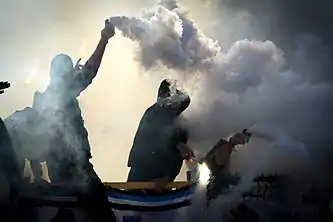
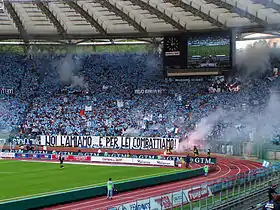
The actions of ultras groups are occasionally extreme and they may be influenced by political ideologies such as conservatism, socialism, or views on racism, which range from avowedly nationalist to anti-fascist.[1] In some instances, this goes to the point where the passionate and loyal support of one's team becomes secondary to the theoretical ideology of the ultras phenomenon.[2] In recent decades, the culture has become a focal point for the movement against the commercialisation of sports and football in particular.[3]
History
The origin of the ultras movement is disputed,[4] with many supporters groups from various countries making claims solely on the basis of their dates of foundation. The level of dispute and confusion is aided by a contemporary tendency (mainly in Europe) to categorise all groups of overtly fanatical supporters as ultras. Supporters groups of a nature comparable to the ultras have been present in Brazil since 1939, when the first torcida organizada was formed (although these groups began to focus on violence in the 1970s). Inspired by the torcidas and the colourful scenes of the 1950 World Cup, supporters of Hajduk Split formed Torcida Split on 28 October 1950.[5] The group is often cited as the oldest torcida style group in Europe. But the first supporters' groups in the world formed to produce violence were barras bravas, originated in Argentina in the 1950s.
One country closely associated with the ultras movement is Italy.[4][6] The first Italian ultras groups were formed in 1951, including the Fedelissimi Granata of Torino. The 1960s saw the continuing spread and development of the culture with the formation of the Fossa dei Leoni and Boys San groups, the former often regarded in Italy as the first full-fledged ultras group (associated with violence). The term ultras was used as a name for the first time in 1969 when supporters of Sampdoria formed the Ultras Tito Cucchiaroni with an acronym of Uniti Legneremo Tutti i Rossoblu A Sangue (such as “all together we will beat the rossoblu fans to blood”, fans of Torino change her name the Ultras Granata in the 70s. The style of support that would become synonymous with Italian football developed most during the 1970s as more groups formed including the radical S.S. Lazio Ultras in 1974 with a strong predominance of fascist slogans and chants amongst other groups such as Hellas Verona supporters. The active support of the ultras became more apparent, in contrast with the "traditional" culture, choreographic displays, signature banners and symbols, giant flags, drums and fireworks became the norm as groups aimed to take their support to higher levels.[7] The decade also saw the violence and unrest of Italian society at the time overlap with the ultras movement, adding a dimension that has plagued it ever since.[8] The ultras movement spread across Europe, Australia, Asia and North Africa during the 1980s, 1990s and 2000s, starting with the countries geographically closest to Italy.[9]
Europe
United Kingdom
Green Brigade are an ultras group that follow Celtic F.C. and regularly make tifo displays and often voice support for a United Ireland and Free Palestine. On the other side of Glasgow are the Rangers F.C ultra group The Union Bears.[10].The Union Bears are known for their elaborate fan displays and their support for Northern Irish and Scottish unionism within the UK.Since 1875 are a ultras group that support Hibernian FCthey are best known for their famous banner time for heroes in the 2016 Scottish cup final they try and stay out of politics mostly however hibs fans as a whole do lean towards Scottish Nationalism and also have strong links to Ireland In England there are ultras groups at Crystal Palace F.C. (Holmesdale Fanatics) Leicester City F.C (Union FS) and Huddersfield Town F.C.[11][12][13] Several Non-League football teams in England have ultras groups that are left-wing, anti-fascist, anti-racist and anti-sexist such as the fans of Dulwich Hamlet F.C. that have a group called the ComFast Chapter who are openly communist.[14][15] A Vice article claims the anti-communists Casuals United is at war with anti-fascist football ultras and have come into conflict with the Clapton Ultras and had already caused the disbandment of the anti-EDL Inter Village Firm that followed Mangotsfield United.[16][17]
Hungary
Several clubs in Hungary have large ultras groups, such as Ferencváros (Green Monsters), Újpest (Viola Fidelity), Diósgyőr (Ultras Diósgyőr), Honvéd (Ultras Kispest, Északi Kanyar), Fehérvár (Red Blue Devils) and Debrecen (Szívtiprók Ultras Debrecen). The national team of Hungary has an ultras group known as the Carpathian Brigade. The group was formed was in 2009. Hungarian ultras occupy sector B Central at the Puskás Aréna
Portugal
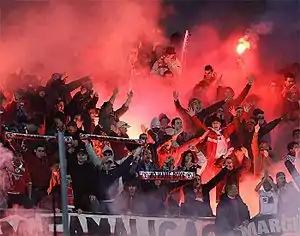
| Stadium | Club | Name |
|---|---|---|
| Estádio do Dragão | FC Porto | - Super Dragões - Colectivo Ultras 95 |
| Estádio do Bessa | Boavista FC | - Panteras Negras |
| Estádio da Luz | SL Benfica | - Diabos Vermelhos - No Name Boys |
| Estádio José Alvalade | Sporting CP | - Juventude Leonina - Torcida Verde - Directivo Ultras XXI - Brigada Ultras Sporting |
| Estádio D. Afonso Henriques | Vitória SC | - White Angels |
Denmark
FC Copenhagen (Sektion 12) and Brøndby IF (Sydsiden) have some of the most renowned ultras groups on the continent, and the derby between the two is also one of the fiercest in Europe. [18]
AaB's Ultra group caused a 14-minute delay in the 2020 Danish Cup final for a failure to adhere to COVID-19 social distancing rules.[19] The group was ultimately ejected from the stadium and the game resumed, which was won by SønderjyskE.
Italy
In Italy, most professional Football Clubs have an ultra group which attend every match and have dedicated seating areas in either the north or south end of the stadium behind the goals. Each ultra will have 1 or more leaders who choreograph chants throughout the match and will hand out banners and flags to other people in the stand to wave throughout the match. Ultras have been credited as to creating fantastic atmospheres inside of the stadium, however have also come under universal criticism with their ties to various gangs and the mafia, as well as causing violence which often takes place outside the stadium prior to a match. Over the years, inappropriate chanting have resulted in the FIGC to issue partial or full stadium bans to clubs. The ultras will choreograph a wide range of chants throughout a match, but some of the most common chants that result in a ban are anti-Southern chants towards clubs which are located in the South of Italy, most notably towards Napoli, as well as racist chants towards opposition players.[20][21]
Africa
Algeria
| Stadium | Club | Name |
|---|---|---|
| July 5, 1962 Stadium | MC Alger | - Ultras the Twelfth Player 2011 - Ultras Green Corsaires 2012 - Ultras Squalo Verde 2019 - Ultras Amore E Montalita 2019 |
| Stade 20 Août 1955, Skikda | JSM Skikda | - Ultras Senza Confine 13 - Ultras Ouled Russicada 2015 |
| Mohamed Hamlaoui Stadium, Constantine | CS Constantine | - Ultras Loca Ragazzi 2010 - Ultras Green Army 2012 |
| April 13, 1958 Stadium, Saida | MC Saida |
- Ultras Méga Boys 2007 |
| August 20, 1955 Stadium (Algiers), | CR Belouizdad |
- Ultras Fanatic Reds 09 |
| Stade 8 Mai 1945, Setif | ES Setif | - Ultras Inferno 10 |
| Stade Omar Hamadi, | USM Alger | - Groupe Ouled El Bahdja |
| Ahmed Zabana Stadium, Oran | MC Oran | - Ultras Red Castle 2011 - Ultras Leones Rey 2009 |
| Maghrebi Unity Stadium | MO Bejaia | - Ultras Granchio 09 - Ultras Saldae Kings 2010 - Ultras Free Men 15 |
| May 19, 1956 Stadium | USM Annaba | - Les indepandants de bone 12 - Ultras Sparta Rosso 2015 |
| November 1, 1954 Stadium (Tizi Ouzou) | JS Kabylie | - Ultras Kabylie Boys 09 - Ultras The Leader 2013 - Ultras Samba Boys 2013 |
| August 20, 1955 Stadium (Algiers), Algiers | NA Hussein Dey |
- Ultras Dey Boys 09 |
| Mohamed Boumezrag Stadium, Chlef | ASO Chlef |
- Ultras Polina 10 |
| November 1, 1954 Stadium (Batna), | CA Batna | - Ultras Aurès Boys 2009 - Ultras Furia Roja 2013 |
| Stade Imam Lyes, Medea | O Medea | - Ultras Matador 26 |
| February 24, 1956 Stadium, Sidi Bel Abbès | USM Bel Abbès |
- Ultras Scorpion Trop Puissant |
| November 1, 1954 Stadium (Algiers) | USM El Harrach |
- Grinta Curva |
| 20 August 1955 Stadium, Bordj Bou Arréridj | CA Bordj Bou Arréridj | - Ultras Commandos 2008 - Ultras Monstros 18 |
| El Alia Sports Complex | US Biskra |
- Ultras Pandilla Ziban |
| Touhami Zoubir Khelifi Stadium | AS Aïn M'lila |
- Red Scorpion |
| Stade Akid Lotfi | WA Tlemcen |
- Ultras Kop 13 |
| Stade 20 Août 1955 (Béchar) | JS Saoura |
- Ultras Giallo Verde |
| Stade Messaoud Zougar | MC El Eulma |
- Ultras Vikings 2009 |
| Maghrebi Unity Stadium | JSM Bejaia |
- Ultras Gouraya United |
| November 1, 1954 Stadium (Batna), | MSP Batna |
- Ultras Pantera Nera 2009 |
| Ismaïl Makhlouf Stadium | RC Arbaâ |
- Ultras Blue Vichingo |
| Stade Tahar Zoughari | RC Relizane |
- Ultras Verde Corazon |
| Stade Mokhtar Abdelatif | Amal Bou Saâda |
- Ultras Ouled el Khadra |
| Habib Bouakeul Stadium | ASM Oran |
- Ultras Verde Lupo |
| Stade Mohamed Reggaz | WA Boufarik |
- Ultras Orange W'arriors 2015 |
| Stade Ben Abdelmalek | MO Constantine |
- Ultras Libertados |
| Rouibah Hocine Stadium | JS Djijel |
- Ultras Green Gunners |
| Brakni Brothers Stadium | USM Blida |
- Ultras Green Killers 2014 |
| Stade Souidani Boujemaa | ES Guelma |
- Ultras Rebells Ragazzi |
| Omar Oucief Stadium | CR Témouchent |
- Ultras Red Wolves |
| Ahmed Kaïd Stadium | JSM Tiaret |
- Ultras Cavalier Blue |
| Stade Amar Benjamaa | ES Collo |
- Ultras Los Marinos 23 |
| Stade Mohamed Bensaïd | ES Mostaganem |
- Ultras Verde Marinero 12 |
| Stade de l'Unité Africaine | GC Mascara |
- Ultras Green Storm 2008 |
| Stade Zerdani Hassouna | US Chaouia |
- Ultras Giallo Boys |
Morocco
Egypt
The clubs in Egypt became a major political force during the uprising against Mubarak in 2011, but were known for long-standing animosity with the police.[22] When 38 members of the Ultras Devils were arrested in Shebeen al-Kom for "belonging to an illegal group" plus additional violent offences, it was seen as a crackdown on the organisations by authorities.[22] Ultras in Turkey have also played a role in the 2013 protests in Turkey, with fans of arch-rivals Galatasaray, Fenerbahçe and Besiktas shielding protesters and allying against police violence. Police responded with raids in the Besiktas neighbourhood, the main breeding ground of ultras of the Beşiktaş club, the Carsi Group.[23]
In 2013, the Associated Press stated that the Egyptian Ultras network was one of the most organised movements in Egypt after the Muslim Brotherhood.[22]
| Stadium | Club | Name |
|---|---|---|
| Cairo International Stadium | Al Ahly SC | - Ultras Ahlawy - Ultras Devils |
| Cairo International Stadium | Zamalek SC | - Ultras White Knights (UWK) |
| Port Said Stadium | Al-Masry SC | - Ultras Green Eagles |
| Suez Stadium | Suez Montakhab | - Ultras Suez Fedyan |
| Ghazl El Mahalla Stadium | Ghazl El Mahalla SC | - Ultras Whales 2008 |
| Ismailia Stadium | Ismaily SC | - Ultras Yellow Dragons - Ultras Rebels |
| Alexandria Stadium | Al Ittihad Alexandria Club | - Ultras Green Magic |
Tunisia
| Stadium | Club | Name |
|---|---|---|
| Stade Olympique de Radès | ES Tunis | - Curva Sud Tunis - Ultras Lemkachkhines 2002 - Supras Sud 2004 - Blood & Gold 2005 - Zapatista Esperanza 2007 - Fedayn Espérantistes 2009 |
| Stade Olympique de Radès | Club Africain | - Curva Nord Tunis - African Winners - Leaders Clubistes - North Vandals - Dodgers Clubistes |
| Stade Taïeb Mhiri | CS Sfaxien | - Curva Nord Sfax - Black & White Fighters 2003 - Raged Boys 2007 - Ultras Sfaxiens 2007 - Leoni Bianconeri 2007 - Drughi Bianconeri 2013 |
| Stade Olympique de Sousse | ES Sahel | - Curva Nord Sousse - Ultras Fanatics 2003 - Ultras Saheliano 2007 |
| Stade 15 October | CA Bizertin | - Ultras Big Boss 2010 - Ultras Marines 2005 |
Asia
Lebanon
The ultras scene was introduced to Lebanon in February 2018, with Nejmeh's "Ultras Supernova".[24][25][26] Their rivals Ansar quickly followed with their own ultras group, "I Tifosi", one month later.[25] Ahed formed their own ultras group, called "Ultras Yellow Inferno", the same year.[26] Prior to the Arab Club Champions Cup game between Nejmeh and Al-Ahly of Egypt, played on 13 August 2018, seven “Ultras Supernova” fans were arrested by the Egyptian national security because of the negative connotations the word “Ultras” has in Egypt.[27] The fans have been returned to Lebanon by request of the Lebanese Ambassador to Cairo.[28]
India
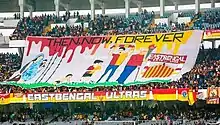
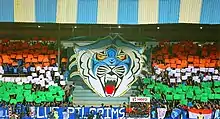
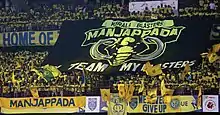
Kolkata Derby is the football match between Mohun Bagan and East Bengal. The rivalry between these two teams is almost 100 years old, and features in the FIFA's classic derby list. The matches witness large audience attendance and rivalry between patrons. It is considered to be one of, if not the biggest Asian footballing rivalry.The most memorable derby on many accounts took place in 1997 at the semi-final of the Federation Cup, when a remarkable crowd of 131,000 – a record attendance for any sport in India – filled a heaving Salt Lake Stadium.
The Ultras scene in India was introduced by East Bengal Ultras, the Ultras group of East Bengal F.C. in 2013 and since then it grew slowly as Ultras groups of various clubs started to form and display of "Tifo's" and "Pyro" shows became very much a part of the Ultras scene in Indian football.[29]
One of the most supported club in Asia, Kerala Blasters FC has their supporters group called Manjappada (Yellow Army). They were founded in May 2014 and became ultras in 2018. During their home matches at Jawaharlal Nehru Stadium (Kochi) the group commits to cover the stadium in as much as yellow colours, which is the primary colour of the club.[30]
Highlander Brigade, the biggest supporters' club of Northeast United FC is also growing in numbers. With intimidating large sized tifos and non stop chanting, they've made their presence felt in the stands. Formed in 2017, they are quickly developing the Ultras scene in the Northeastern part of the country. During home games at the Indira Gandhi Athletic Stadium in Guwahati, their typical routine begins with a march to the stadium, followed by the display of tifos and banners before the start of the game and then 90 mins of intense chanting with megaphones and drums while waving flags of red, black and white.
Blue Pilgrims is an organised group of football fans who support the India national football men's team, women's team, and all the other age–group national teams at every home and away game formed by a group of football fans of several club fan bases of football clubs from India. Founded in 2017 before the commencement of the 2017 FIFA U-17 World Cup, which was held in India, the group based their name on the nickname of the national team, the "Blue Tigers". They consider travelling with the national teams to wherever the teams play as their pilgrimage. They often display flags, banners, and tifos in support of the national team.[31]
| Stadium | Club | Name |
|---|---|---|
| Salt Lake Stadium, Kolkata | East Bengal F.C. | East Bengal Ultras |
| Salt Lake Stadium, Kolkata | East Bengal F.C. | East Bengal the Real Power |
| Salt Lake Stadium, Kolkata | Mohun Bagan A.C. | Mariners' Base Camp[32] |
| Jawaharlal Nehru Stadium (Kochi) | Kerala Blasters FC | Manjappada (Yellow Army)[33] |
| Kalinga Stadium | Odisha FC | The Juggernauts |
| Sree Kanteerava Stadium | Bengaluru FC | West Block Blues |
| Indira Gandhi Athletic Stadium | Northeast United FC | Highlander Brigade |
North America
Canada
| Stadium | Club | Name |
|---|---|---|
| Stade Saputo | CF Montréal | Ultras Montréal |
| BMO Field | Toronto FC | Inebriatti |
United States
| Mercedes-Benz Stadium | Atlanta United | Guerilla Company[34] |
| Audi Field | D.C. United | District Ultras[35] |
| Avaya Stadium | San Jose Earthquakes | 1906 Ultras[36] |
| Red Bull Arena | New York Red Bulls | Garden State Ultras[37] |
| Subaru Park | Philadelphia Union | Keystone State Ultras[38] |
| CenturyLink Field | Seattle Sounders FC | Emerald City Supporters[39] |
| Dignity Health Sports Park | Los Angeles Galaxy | Ghosts Ultras Galaxy |
| Providence Park | Portland Timbers | Timbers Army |
Characteristics
Ultras groups are usually centred on a core group of founders or leaders (who tend to hold executive control),[40] with smaller subgroups organised by location, friendship or political stance. Ultras tend to use various styles and sizes of banners and flags bearing the name and symbols of their group.[40][41] Some ultras groups sell their own merchandise to raise funds for performing displays.[40][42] An ultras group can number from a handful of fans to hundreds or thousands, with larger groups often claiming entire sections of a stadium for themselves. Ultras groups often have a representative who liaises with the club owners on a regular basis, mostly regarding tickets, seat allocations and storage facilities.[40] Some clubs provide groups with cheaper tickets, storage rooms for flags and banners and early access to the stadium before matches in order to prepare displays. These types of favoured relationships are often criticised when ultras groups abuse their power.[1]
Hooliganism
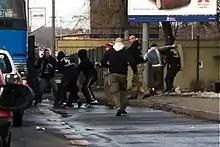
While ultras groups can become violent, the majority of matches attended by ultras conclude with no violent incidents. Unlike hooligan firms, whose main aim is to fight hooligans of other clubs, the main focus of ultras is generally to support their own team.[43] Some hooligans try to be inconspicuous when they travel; usually not wearing team colours, in order to avoid detection by the police. Within the ultra or hooligan culture however, those dressing to "blend in" would be referred to as casuals, which is viewed by some as a branch of hooliganism, yet still maintaining its own independence and culture. Ultras tend to be more conspicuous when they travel, proudly displaying their scarves and club colours while arriving en masse, which allows the police to keep a close eye on their movements.
See also
References
- "The dark heart of Italian soccer". CBC Sports. 15 April 2005. Archived from the original on 24 February 2011. Retrieved 18 January 2011.
- "Fan tragedy sends the fight against Ultras back to square one". The Guardian. 12 November 2007. Archived from the original on 4 December 2013. Retrieved 18 January 2011.
- "Are German fans really turning against the beautiful game?". The Guardian. 7 April 2008. Archived from the original on 4 December 2013. Retrieved 18 January 2011.
- "We Don't Fight, We Paint Flags Instead". In Bed With Maradona. 2 November 2010. Archived from the original on 13 July 2011. Retrieved 5 February 2011.
- "Povijest". Torcida.hr (in Croatian). Archived from the original on 17 February 2011. Retrieved 5 February 2011.
- "Ultra sensitive". When Saturday Comes. April 2007. Archived from the original on 24 January 2011. Retrieved 18 January 2011.
- "Ultras rule?". Football Italia. 28 October 2009. Archived from the original on 23 November 2010. Retrieved 18 January 2011.
- Alberto Testa, Gary Armstrong (2010). Football, Fascism and Fandom. A&C Black. ISBN 978-1-4081-2371-3.
- "Passion, politics and violence: A socio-historical analysis of Spanish ultras". March 2005. Cite journal requires
|journal=(help) - https://www.eveningtimes.co.uk/news/16196253.rangers-ultras-union-bears-eerie-message-after-ibrox-fans-storm-own-poty-awards-in-glasgow/
- Bakowski, Gregg (23 October 2016). "Ultra culture could help Premier League terraces take positive steps". The Guardian. Archived from the original on 11 April 2018. Retrieved 10 April 2018.
- "Palace 'ultras' causing anxiety". ESPN. Archived from the original on 11 April 2018. Retrieved 10 April 2018.
- Barker, Matthew. "When Saturday Comes - Crystal Palace ultras under pressure from club and fans". When Saturday Comes. Archived from the original on 11 April 2018. Retrieved 10 April 2018.
- "Eastbourne Town's 'ultras' are game for a laugh and making football welcome to all". iNews. 16 November 2017. Archived from the original on 11 April 2018. Retrieved 10 April 2018.
- "London's Left-Wing Utopian Non-League Ultras Are Reclaiming Football". Vice. 5 January 2015. Archived from the original on 11 April 2018. Retrieved 10 April 2018.
- "The English Far-Right's War on Anti-Fascist Football Ultras". Vice. 13 February 2015. Archived from the original on 11 April 2018. Retrieved 10 April 2018.
- "The FA – Kicking anti-racism out of football". Supporters Not Customers. 16 January 2014. Archived from the original on 11 April 2018. Retrieved 10 April 2018.
- "The Copenhagen Derby". Outside Write. 31 March 2016. Retrieved 9 September 2020.
- "Danish Cup Final Delayed". bbc.com. 1 July 2020.
- Jones, Tobias (15 September 2019). "At home with Italy's ultras: 'It isn't about watching football, but watching each other'". The Guardian. ISSN 0261-3077. Retrieved 29 July 2020.
- Monella, Lillo Montalto (9 November 2019). "Racism in football: Are Italy's Ultras the problem or the solution?". euronews. Retrieved 29 July 2020.
- el Deeb, Sarah (14 March 2013). "Egypt: 38 soccer fans charged with violence". USA Today. Associated Press. Archived from the original on 10 October 2017. Retrieved 10 October 2017.
- "Ultras: The Surprise Kids ff Turkey’s Uprising" Archived 7 June 2013 at the Wayback Machine, Al Monitor website (posted 4 June)
- "المدرجات لا تعترف إلا بالشجعان". lebanonfg.com. Retrieved 23 February 2019.
- COPA90. "Ultras Supernova: Lebanon's First Ultras Group". www.facebook.com. Retrieved 23 February 2019.
- "مباريات قويّة في الجولة العاشرة". الأخبار (in Arabic). Retrieved 23 February 2019.
- "قضية مشجعي "النجمة" الموقوفين في مصر... ماذا جرى معهم؟". LBCI Lebanon (in Arabic). Retrieved 23 February 2019.
- "Lebanese Nejmeh fans to be deported days after arrest at Borg al-Arab Stadium | MadaMasr". madamasr.com. Retrieved 25 February 2019.
- "A Fans Revolution : East Bengal Ultras - GoalBold". 3 July 2018. Archived from the original on 3 July 2018. Retrieved 5 January 2021.
- Nicolai Nayak. "Indian football: Meet Manjappada, the 12th man of Kerala Blasters and ISL's biggest fan group". Scroll.in. Retrieved 5 January 2021.
- "Indian national football teams to have dedicated fan base named 'Blue Pilgrims". www.sportskeeda.com. 3 October 2017. Retrieved 2 October 2019.
- "Mariners' Base Camp – The Ultras of The National Club of India Mohun Bagan". Retrieved 28 December 2019.
- "Manjappada | Heart Beat of Kerala Blasters - Welcome To Official Website of Manjappada (Kerala Blasters Fans). Stay Connected With Us For Latest KBFC Updates". Manjappada | Heart Beat of Kerala Blasters. Retrieved 28 December 2019.
- "Guerilla Company - Home".
- "District Ultras - Home".
- "San Jose Ultras - Home". sanjoseultras.com.
- "Garden State Ultras - Home".
- "Keystone State Ultras - Home".
- "Emerald City Supporters - Home".
- "Ultras pull the strings as Italy descends into chaos". The Guardian. 4 February 2007. Archived from the original on 2 October 2014. Retrieved 5 February 2011.
- "Gruppi". asromaultras.org (in Italian). Archived from the original on 12 February 2011. Retrieved 5 February 2011.
- "AS Roma Ultras". asromaultras.org (in Italian). Archived from the original on 13 February 2011. Retrieved 18 January 2011.
- "Ultra vires". Spiked. 9 February 2007. Archived from the original on 24 February 2011. Retrieved 18 January 2011.
Further reading
| Wikimedia Commons has media related to Ultras. |
- Dyal, Mark. (2018) Hated & Proud: Ultras Contra Modernity, London, Arktos.
- Guerra Nicola (2014). "Il discorso e la lingua speciale del calcio, una definizione inclusiva. I meccanismi di creazione dei neologismi e le dinamiche di contatto e interferenza" Annals of the University of Craiova https://www.academia.edu/4566221. Missing or empty
|title=(help) - Guerra Nicola (2011). "Meccanismi e significati linguistici di un'identità contemporanea: analisi dello spazio linguistico di una tifoseria ultras di calico" Annals of the University of Craiova"". External link in
|title=(help); Missing or empty|url=(help) - Guerra Nicola, Valentina Imperi, Claudia Vardanega (2010). "I Poeti della Curva: Un'analisi sociolinguistica degli striscioni allo stadio" Aracne"". External link in
|title=(help); Missing or empty|url=(help) - Prof. Dr. Gunter A. Pilz: "International Conference on Ultras. Overview of the Ultra culture phenomenon in the Council of Europe member states in 2009" (PDF). (195 KB) Leibniz University Hanover, 18 January 2010.
- Testa, A. and Armstrong, G. (2008). "Words and actions: Italian ultras and neo-fascism" Social Identities, vol. 14 (4), pp. 473 – 490
- Testa, A. (2009) "UltraS: an Emerging Social Movement", Review of European Studies, vol. 1 (2), 54-63
- Testa, A. (2010). Contested Meanings: the Italian Media and the UltraS. Review of European Studies, vol 2(1), 15-24
- Testa, A. and Armstrong, G. (in press; November 2010). Football, Fascism and Fandom: The UltraS of Italian Football, A&C (Bloomsbury), London, Black Publishers.
- "Violence Threats to Italian Iconic Landmarks and Stadiums".TAL Global Corporation.